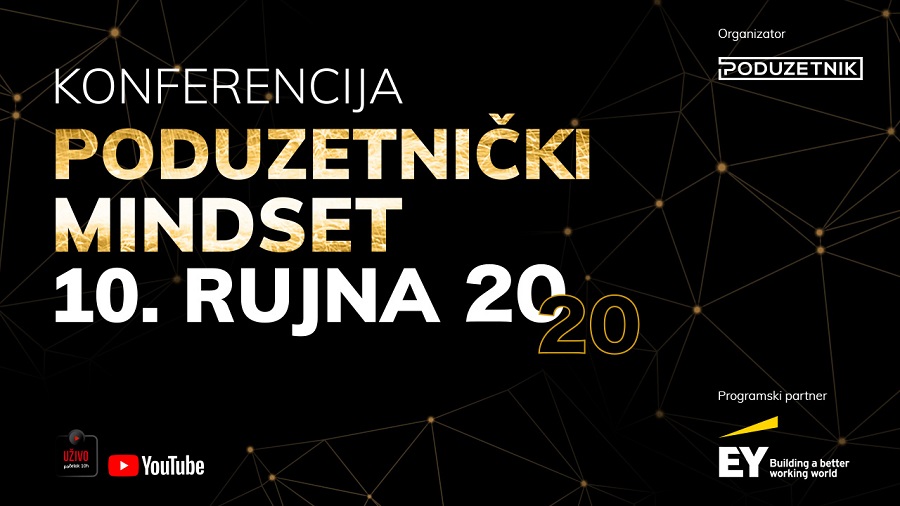September 8, 2020 - The second Poduzetnik Mindset (Entrepreneurial Mindset) conference takes place online on September 10. Continuing our look at the speakers, meet Ana Hanzekovic from Hanza Media.
With just two days to go until Poduzetnicki Mindset (Entrepreneurial Mindset) 2020, our focus on the strong line-up of speakers continues with Ana Hanzekovic, board member of Hanza Media, whose numerous media titles include Jutarnji List and Slobodna Dalmacija.
1. It is great to see leading Croatian media supporting this conference. Tell us first how you see the entrepreneurial scene in Croatia, and are you seeing changes?
We all know that in the important rankings such as the World Bank’s Doing Business and World Economic Forum’s Global Competitiveness Index Croatia lags behind its neighbors and most former Eastern Block countries. The general public usually does not view these rankings as anything more than a billboard chart, but for us who have to operate a company they are an illustration of real-life problems. We have the responsibility of developing a successful business in order to provide salaries, maintain employment and pay taxes in an environment that more often produces obstacles to business than it stimulates its growth.
2. Why is the entrepreneurial mindset so important in Croatia, and how can we improve it?
Entrepreneurship is the engine of growth and job creation, it develops and generates new values in and for the whole community. We have positive examples of similar countries registering much higher growth rates by unleashing their entrepreneurial potential. We also have action plans from the EU focused on creating new businesses and a more supportive environment for existing ones. And also EU money earmarked for that. The COVID-19 crisis has provided us with a new opportunity to reset. And we as media have also a role to play in that.
3. Running Hanza Media is a huge challenge. Tell us about your own entrepreneurial mindset and the challenges of running such an influential media in these challenging times.
It is a huge challenge for several reasons. We acquired Hanza Media in a pre-bankruptcy settlement process. It was a heavily indebted organization with structural problems. We have restructured it, paid-off the debts, taking on a heavy personal financial burden. Besides that, before Hanza Media, I ran a pharmaceutical company. I knew how the business side works, but publishing is a rapidly changing environment, with an eroding legacy business model and a need to quickly adapt to new ones. It is a transformation that we had to go through in parallel to restructuring the company and servicing the debts. And finally, there is the question of the influence of our publications. At the beginning I was surprised at the number of reactions to our writing. And not only in Jutarnji list or Slobodna Dalmacija, but also in the lifestyle segments or in Sportske novosti. There is always someone thinking she or he should have been treated differently, but that is not the publishers job and I leave it to our editors.
4. Entrepreneurs have a different reputation in Croatia than in countries such as the UK or USA. Why is that, do you think?
In Croatia people who take personal risk to contribute to the wealth of the country are still often viewed with hostility, and it’s challenging, sometimes even hard, to work in that kind of environment. In every day we must have the knowledge and courage, the commitment to work and to have confidence in our team. This is how we in Hanza media use this crisis as an opportunity, by working together, creating new innovative solutions for both our clients and readers.
5. The process of digitalisation is slowly taking a hold in Croatia. What are your views on the process so far, and what needs to be done to accelerate this process?
It would be pretentious of me to offer recommendations on the processes of digitalisation and digital transformation in general. But as a publisher I have given a clear guidance to all in the company: we are a digital publishing company. We are reaching our audiences mainly through digital channels and we are using digital tools to manage our audiences. And we employ more and more people with new skills in order to carry on our transformation.
6. There has been much talk in the media about the introduction of a digital nomad visa for Croatia. What are your views on this, and how much could it benefit the Croatian economy?
I think that visa models that enable the exchange of knowledge and increase mobility can attract top individuals, talents, gain new values and growth possibilities.
7. How important are conferences such as Poduzetnicki Mindset, and what are you hoping to get from the conference?
I welcome every opportunity to expand our knowledge, exchange experiences, support each other or get new ideas and inspire ourselves. We live in a time when it is important to keep faith in our own values and opportunities. In a crisis, we discover our possibilities, connect, meet leaders and managers who have the same problems, and share experiences.

Read also interviews with Ognjen Bagatin of Bagatin Clinic and Jan de Jong of Webpower Adria.
To learn more about the virtual Poduzetnik Mindset 2020 conference on September 10 - and to register - visit the official website.


